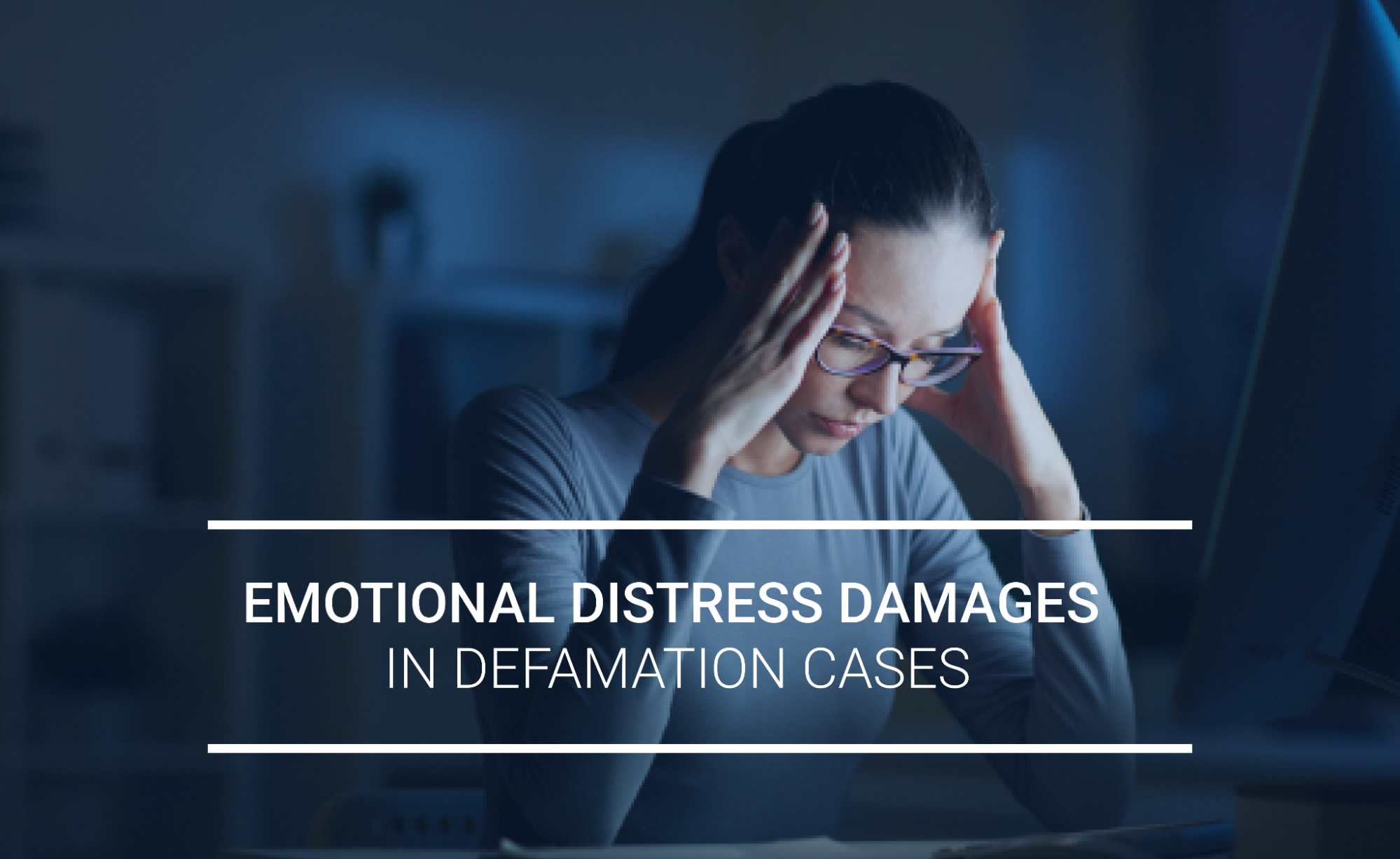Overview
- Definition and Types – Emotional distress refers to psychological suffering caused by traumatic events, categorized into Negligent Infliction of Emotional Distress (NIED) and Intentional Infliction of Emotional Distress (IIED).
- Legal Considerations – Emotional distress damages are compensatory, not punitive, and may apply in defamation and personal injury cases.
- Proving and Quantifying Damages – Courts require medical records, expert testimony, and established calculation methods such as the multiplier or per diem method.
- Limitations and Tax Implications – Statutory and jurisdictional limits apply, and damages may be taxable unless linked to a physical injury.
Emotional distress damages play a crucial role in legal cases, particularly in the context of internet defamation. Understanding how these damages are assessed and quantified is essential for legal professionals, plaintiffs, and expert witnesses alike. An internet defamation expert witness can provide critical insights into the impact of emotional distress and assist in determining appropriate compensation.
What is Emotional Distress?
Emotional distress refers to the psychological suffering caused by a traumatic event, including defamation, accidents, or intentional harm. It can manifest as anxiety, depression, or other mental health issues.

What Are the Two Types of Emotional Distress?
- Negligent Infliction of Emotional Distress (NIED): Occurs when the defendant carelessly causes emotional harm to the plaintiff.
- Intentional Infliction of Emotional Distress (IIED): Happens when the defendant’s actions are deliberate and extreme, leading to significant emotional harm.
What Is the Difference Between Stress and Emotional Distress?
Stress is a general response to external pressures, while emotional distress involves severe and often prolonged psychological suffering that affects daily life.
Is Emotional Distress Pain and Suffering?
Yes, emotional distress is a component of pain and suffering damages, encompassing mental anguish, loss of enjoyment of life, and psychological trauma.
H3: How Long Can Emotional Distress Last?
The duration varies depending on individual circumstances, the severity of the event, and the effectiveness of psychological treatment.
Is Emotional Distress a Defense?
In New York, Extreme Emotional Disturbance (EED) is a defense available exclusively in murder cases, potentially reducing a charge from murder to manslaughter.
What Is Emotional Distress Damages?
Emotional distress is a part of defamation damages, compensating victims for the psychological toll of harmful actions, including online defamation.
Is Emotional Distress Punitive Damages?
No, emotional distress typically falls under compensatory damages, not punitive damages, which are meant to punish the defendant.
Emotional Distress Damages for Loss of a Pet
Courts may award damages for emotional distress caused by the wrongful injury or loss of a pet, though such awards vary by jurisdiction.
What Is an Example of Emotional Damage?
Examples include anxiety, depression, PTSD, and severe distress from wrongful accusations or defamation.
Types of Emotional Distress Damages
Intentional Infliction of Emotional Distress (IIED)
IIED involves four key elements:
- Extreme and outrageous conduct
- Intent to cause emotional distress
- Actual suffering of distress
- A causal connection between the act and distress
Example: A defamatory online campaign deliberately designed to ruin a person’s reputation and cause severe mental anguish.
Negligent Infliction of Emotional Distress (NIED)
Occurs when the defendant’s negligent actions lead to severe emotional suffering.
Example: A reckless news article falsely accusing an individual of criminal activity, leading to anxiety and reputational damage.
Loss of Consortium
Loss of consortium claims involve four elements:
- Loss of companionship
- Loss of affection or care
- Impact on intimate relationships
- Proof of damage to personal life

Pain and Suffering Damages for Emotional Distress
Severity and Duration of Emotional Distress
The extent of distress can influence the compensation awarded in a legal case.
Impact on Daily Life and Functioning
Emotional distress can lead to lost productivity, social withdrawal, and physical health problems.
Contributing Factors or Events
The nature of the event that caused distress, such as online defamation, workplace harassment, or personal attacks, plays a crucial role in damage assessment.
Limits on Emotional Distress Damages
Statutory Limits
Some states impose caps on the amount of emotional distress damages a plaintiff can recover.
Jurisdictional Limits
Different jurisdictions have varying criteria for proving and awarding emotional distress damages.
Comparative Fault and Contributory Negligence
In some cases, a plaintiff’s own actions may reduce the amount of damages awarded.

How to Prove Emotional Distress in Court?
Suing for emotional distress requires demonstrating the legitimacy of psychological harm through credible evidence.
Evidence Required to Prove Emotional Distress Damages
- Medical records
- Psychological evaluations
- Testimony from family and friends
Expert Testimony and Medical Evidence
Expert witnesses, such as mental health professionals, can validate the severity of emotional distress claims.
Quantifying Emotional Distress Damages with the Help of an Internet Defamation Expert Witness
Internet defamation experts analyze the impact of online harm on an individual’s emotional and psychological well-being, helping courts assess appropriate damages.
Cases Where Emotional Damages Were Awarded
Some examples of cases where emotional distress settlements were awarded are:
- McCormick v. Department of Justice (Federal Bureau of Investigation), EEOC Appeal 0720100040 (November 23, 2011) ($200,000 award for emotional distress)
- Linehan v. Marion County Coroner’s Office, EEOC Appeal No. 1120080001 (August 24, 2009) ($200,000 award for emotional distress)
- Fonda-Wall v. Department of Justice, EEOC Appeal No. 0720060035 (July 29, 2009) (The Commission increased an administrative judge’s award for emotional distress from $150,000 to $200,000.)
In McCormick v. DOJ, the Equal Employment Opportunity Commission did not hold the plaintiff’s disability in a high enough regard. The commission decided the defendant acted ineptly. While in Linehan v. Marion County Coroner’s Office, they ruled that the plaintiff suffered distress from being fired and was defamed in the press. Lastly, in Fonda-Wall v. DOJ, the claimant was judged to be in constant fear of retaliation from their supervisor, and the supervisor spread rumors about the plaintiff’s alleged mental health problems.
How to Quantify Emotional Distress Damages?
Determining the financial value of emotional distress requires established legal methodologies.
How Do You Value Emotional Distress Damages?
Courts consider factors such as severity, duration, and impact on the plaintiff’s life.
How to Calculate Emotional Distress Damages?
Several methods exist for quantifying emotional distress damages:
Multiplier Method
A multiplier is applied to economic damages (e.g., lost wages) to estimate non-economic damages like emotional distress.
Per Diem Method
A daily rate is assigned to the emotional distress and multiplied by the number of affected days.
Yardstick Method
Uses similar cases as a benchmark to determine a reasonable damage amount.
Hybrid Method
Combines multiple approaches to ensure a fair and just evaluation.
Are Emotional Distress Damages Taxable?
Emotional distress damages may be taxable unless they stem from a physical injury or illness, per IRS regulations.
Conclusion
Emotional distress damages are a critical aspect of legal cases, particularly in internet defamation. Understanding the types, limits, and methods of quantification is essential for fair compensation. With expert witnesses and legal evidence, plaintiffs can effectively demonstrate the impact of emotional distress and seek appropriate redress.
Frequently Asked Questions
1. Can I sue for emotional distress if I was not physically injured?
Yes, depending on jurisdiction and severity of distress.
2. How do courts determine if emotional distress is legitimate?
They assess medical records, expert testimony, and psychological evaluations.
3. What types of cases commonly involve emotional distress claims?
Defamation, harassment, personal injury, and wrongful termination cases.
4. How much compensation can I receive for emotional distress damages?
It varies based on severity, duration, and jurisdictional laws.
5. Can an internet defamation expert witness help my case?
Yes, they assess the impact of online defamation and quantify damages.
6. Is there a time limit for filing an emotional distress claim?
Yes, statutes of limitations vary by jurisdiction.
Online Defamation Cases Can Ruin a Company’s Reputation and Future.
Let Us Help You Sail Through the Crisis Knowing You Are in Good Hands.













